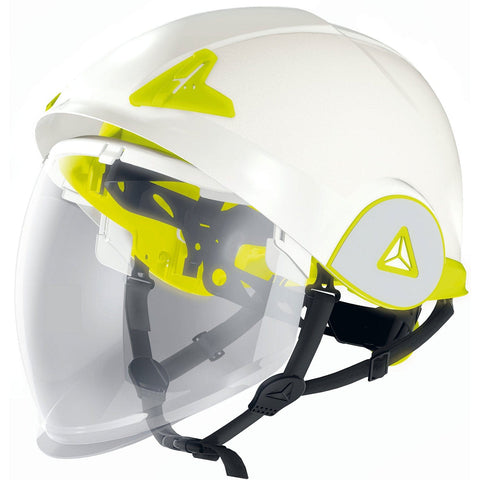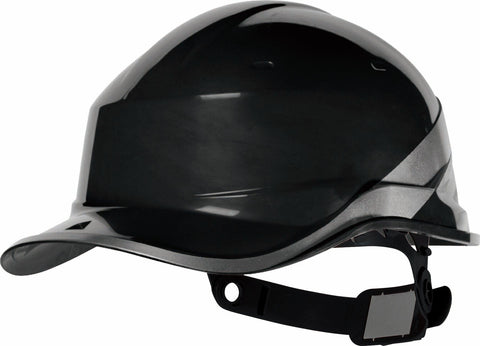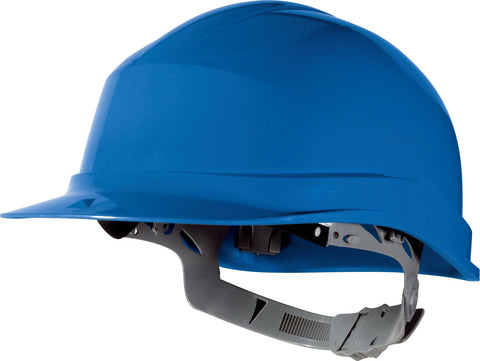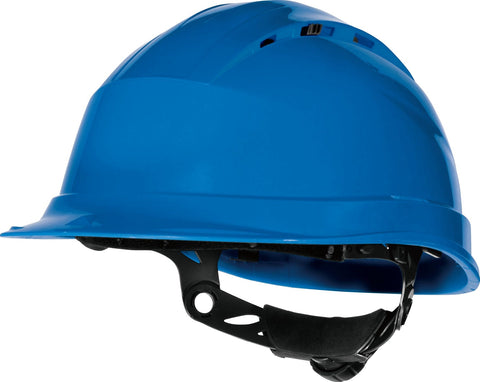Safety Helmets
Safety Helmets
Welcome to Street Solutions, your one-stop destination for top-quality safety helmets and head protection gear. Our wide range of safety helmets is meticulously crafted with a focus on impact resistance, providing optimal head protection in various industries and activities. From hard hats to climbing helmets, bicycle helmets to firefighting helmets, welding helmets to military helmets, our collection covers it all.
At Street Solutions, we prioritise your safety without compromising on comfort. Our lightweight and adjustable safety helmets offer a snug and secure fit for all-day wear. With high-visibility attributes that meet safety regulations, our helmets enhance visibility even in low-light conditions.
Rest assured, our safety helmets are ANSI-certified and OSHA-approved, ensuring compliance with the highest safety standards. We understand the paramount importance of workplace safety and the rigorous demands of industries where head protection is crucial.
Browse our collection today and equip yourself with the finest safety helmets and head protection gear. Whether you're in construction, manufacturing, or any other high-risk industry, Street Solutions has the perfect helmet to keep you safe. Your well-being is our top priority, providing you with the utmost protection and peace of mind.
Our collection includes:
Shop now and experience superior head protection with Street Solutions. Invest in your safety and stay protected in any environment.
Express delivery and bulk discounts available to buy. For more information on our products or to get a custom quote on larger orders please get in touch with our sales team on 0161 706 0479 or email us at sales@streetsolutionsuk.com
Frequently Asked Questions
Q: Why are safety helmets important?
A: Safety helmets are important because they protect the head from potential hazards in the workplace or during recreational activities. They help prevent head injuries from falling objects, collisions, or other types of impact, which can be serious or even fatal.
Q: Who should wear safety helmets?
A: Safety helmets should be worn by anyone who is at risk of head injuries in the workplace or during recreational activities. This includes workers in industries such as construction, mining, manufacturing, and others, as well as athletes participating in high-impact sports.
Q: What are the different types of safety helmets?
A: There are many different types of safety helmets, each designed for specific industries and applications. Common types include hard hats for construction workers, climbing helmets for mountaineers, and bicycle helmets for cyclists. Other types may include firefighting helmets, welding helmets, and military helmets.
Q: What features should I look for in a safety helmet?
A: When choosing a safety helmet, it is important to look for features such as durability, impact resistance, ventilation, adjustable straps, and removable liners for added comfort and customization. It is also important to choose a helmet that meets relevant safety standards and regulations.
Q: How do I ensure proper fit and maintenance of my safety helmet?
A: To ensure proper fit, make sure the helmet is snug but not too tight, with the brim or edge level with the eyebrows. Adjust the straps as needed for a comfortable and secure fit. To maintain the helmet, follow the manufacturer's guidelines for cleaning, inspection, and replacement. Replace the helmet if it has been involved in a significant impact or shows signs of damage or wear.
Q: Where can I purchase high-quality safety helmets?
A: High-quality safety helmets can be purchased from various suppliers, including online retailers and specialty safety equipment providers. It is important to choose a reputable supplier that offers high-quality equipment and excellent customer service.
Q: What are safety helmets and why are they important?
A: Safety helmets, also known as hard hats, are essential personal protective equipment (PPE) designed to protect the wearer's head from potential hazards in the workplace. They play a crucial role in safeguarding against falling objects, electrical shocks, impacts, and other head injuries. Safety helmets are important as they minimize the risk of traumatic brain injuries and ensure compliance with workplace safety regulations.
Q: How do safety helmets provide head protection?
A: Safety helmets provide head protection by employing a combination of impact resistance and shock absorption. They are typically made from durable materials such as high-density polyethylene (HDPE) or thermoplastic, which can withstand substantial forces. The construction of safety helmets includes a suspension system that helps absorb and distribute the impact energy, protecting the wearer's head from injury.
Q: What is the purpose of personal protective equipment (PPE) in the workplace?
A: Personal protective equipment (PPE) serves the purpose of safeguarding workers from potential hazards in the workplace. It includes various protective gear, such as safety helmets, goggles, gloves, and safety footwear. PPE acts as a physical barrier, reducing the risk of injuries and ensuring a safer work environment for employees.
Q: Are safety helmets mandatory for certain industries or activities?
A: Yes, safety helmets are mandatory in many industries and activities where there is a risk of head injuries. Industries such as construction, manufacturing, mining, and forestry commonly require workers to wear safety helmets as part of their personal protective equipment. Additionally, activities like climbing, cycling, and firefighting also necessitate the use of appropriate safety helmets.
Q: What is the significance of impact resistance in safety helmets?
A: Impact resistance is a critical factor in safety helmets as it determines their ability to withstand and dissipate the force of an impact. Safety helmets with high impact resistance are designed to minimize the risk of head injuries caused by falling objects or accidental collisions. It is important to choose safety helmets that comply with relevant safety standards to ensure optimal impact protection.
Q: How do hard hats differ from other types of safety helmets?
A: Hard hats are a specific type of safety helmet typically used in industrial and construction environments. They are distinguishable by their rigid, dome-shaped design and provide protection against falling objects, electrical hazards, and impacts. While other types of safety helmets may cater to specific activities or industries, hard hats are more versatile and widely used across various sectors due to their robust construction and compliance with safety regulations.
Q: What are the key features to consider when choosing a safety helmet?
A: When choosing a safety helmet, consider the following key features: impact resistance, comfort, adjustability, ventilation, compatibility with other PPE, and compliance with safety regulations. Opt for a helmet that provides adequate protection, fits securely on the head, offers ventilation to prevent discomfort, and can be adjusted to accommodate different head sizes.
Q: Are climbing helmets suitable for industrial and construction work?
A: Climbing helmets are primarily designed for activities such as rock climbing and mountaineering, where protection against falling rocks and impacts is crucial. While they provide adequate head protection for these activities, they may not meet the specific safety requirements of industrial and construction work. It is recommended to use safety helmets that comply with the relevant safety standards and regulations for such work environments.
Q: Can bicycle helmets be used as safety helmets in the workplace?
A: While bicycle helmets provide head protection for cycling activities, they may not meet the specific safety standards required for workplace environments. Workplace safety helmets are designed to meet industry-specific regulations and offer additional features and protection tailored to the hazards present in those settings. It is essential to use safety helmets specifically designed and certified for workplace use to ensure maximum safety and compliance with regulations.
Q: What are the specialized features of firefighting helmets?
A: Firefighting helmets are specifically designed to provide enhanced protection for firefighters in high-heat and hazardous environments. They typically feature heat-resistant materials, a face shield or visor to protect against heat, smoke, and debris, and an integrated communication system. Firefighting helmets also offer impact resistance and are often equipped with a reflective surface for increased visibility in low-light conditions.
Q: Are welding helmets different from standard safety helmets?
A: Yes, welding helmets differ from standard safety helmets due to their specialized design for protecting against the intense light, sparks, and infrared and ultraviolet radiation generated during welding processes. Welding helmets have a dark tinted lens that automatically darkens to shield the welder's eyes from the bright welding arc. They also provide face and head protection from welding spatter and debris.
Q: Do military helmets meet the same safety regulations as industrial helmets?
A: Military helmets, also known as combat helmets, are designed to meet the specific requirements of military applications, such as ballistic protection. While they provide protection against ballistic threats and combat-related hazards, military helmets may not necessarily comply with the same safety regulations as industrial helmets used in civilian workplaces. It is important to choose helmets that meet the relevant safety standards for the intended purpose.
Q: What safety regulations should I be aware of when purchasing a safety helmet?
A: When purchasing a safety helmet, it is important to be aware of the relevant safety regulations and standards in your industry or region. Common safety standards for helmets include ANSI/ISEA Z89.1 (for industrial head protection) and DOT or Snell (for motorcycle helmets). Additionally, familiarize yourself with any specific regulations or requirements set forth by regulatory bodies such as OSHA (Occupational Safety and Health Administration) or local authorities.
Q: How often should safety helmets be inspected and replaced?
A: Safety helmets should be regularly inspected according to the manufacturer's guidelines and any applicable regulations. Inspections typically include checking for cracks, deformities, or other signs of damage that could compromise the helmet's integrity. As for replacement, helmets should be replaced if they have been involved in an impact or if they show signs of damage. Additionally, follow the manufacturer's recommended lifespan, which is usually indicated by a specific period or the helmet's production date.
Q: Are there any specific care instructions for maintaining safety helmets?
A: Yes, there are general care instructions for maintaining safety helmets. Clean the helmet regularly with mild soap and water, avoiding abrasive cleaners or solvents that could damage the materials. Inspect the straps, buckles, and suspension system for wear or damage, and replace them if necessary. Store the helmet in a cool, dry place away from direct sunlight and chemicals. Additionally, avoid modifying the helmet or using it for purposes other than its intended function to ensure its effectiveness and longevity.





